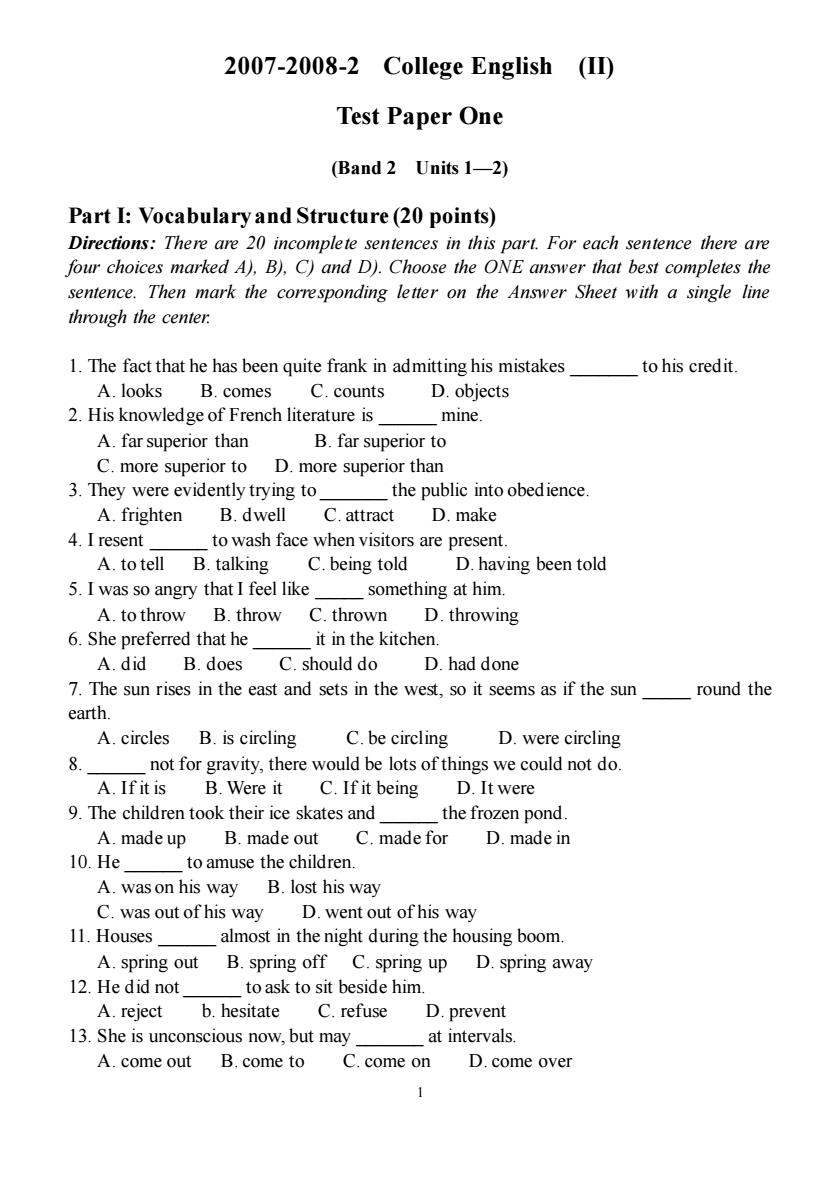
2007-2008-2 College English (II) Test Paper One (Band 2 Units 1-2) Part I:Vocabulary and Structure(20 points) Directions:There are 20 incomplete sentences in this part for each sentence there are four choices marked A).B).C)and D).Choose the ONE answer that best completes the sentence.Then mark the corresponding letter on the Answer Sheet with a single line through the centen 1.The fact that he has been quite frank in admitting his mistakes to his credit A.looks B.comes C.counts D.objects 2.His knowledge of French literature is mine. A.far superior than B.far superior to C.more superior to D.more superior than 3.They were evidently trying to_ _the public into obedience. A.frighten B.dwell C.attract D.make 4.Iresent to wash face when visitors are present. A.totell B.talking C.being told D.having been told 5.I was so angry that I feel like something at him. a to throw B.throw C thrown D.throwing 6.She preferred that he it in the kitchen. A.did B.does C.should do D.had done 7.The sun rises in the east and sets in the west,so it seems as if the sun round the earth. A.circles B.is circling C.be circling D.were circling 8 not for gravity,there would be lots of things we could not do. A.If it is B.Were it C.If it being D.It were 9.The children took their ice skates and the frozen pond. A.made up B.made out C.made for D.made in 10.He to amuse the children. A.was on his way B.lost his way C.was out of his way D.went out of his way 11.Houses almost in the night during the housing boom. A.spring out B.spring off C.spring up D.spring away 12.He did not to ask to sit beside hin A.reject b.hesitate C.refuse D.prevent 13.She is unconscious now,but may at intervals. A.come out B.come to C.come on D.come over
1 2007-2008-2 College English (II) Test Paper One (Band 2 Units 1—2) Part I: Vocabulary and Structure (20 points) Directions: There are 20 incomplete sentences in this part. For each sentence there are four choices marked A), B), C) and D). Choose the ONE answer that best completes the sentence. Then mark the corresponding letter on the Answer Sheet with a single line through the center. 1. The fact that he has been quite frank in admitting his mistakes _______ to his credit. A. looks B. comes C. counts D. objects 2. His knowledge of French literature is ______ mine. A. far superior than B. far superior to C. more superior to D. more superior than 3. They were evidently trying to _______ the public into obedience. A. frighten B. dwell C. attract D. make 4. I resent ______ to wash face when visitors are present. A. to tell B. talking C. being told D. having been told 5. I was so angry that I feel like _____ something at him. A. to throw B. throw C. thrown D. throwing 6. She preferred that he ______ it in the kitchen. A. did B. does C. should do D. had done 7. The sun rises in the east and sets in the west, so it seems as if the sun _____ round the earth. A. circles B. is circling C. be circling D. were circling 8. ______ not for gravity, there would be lots of things we could not do. A. If it is B. Were it C. If it being D. It were 9. The children took their ice skates and ______ the frozen pond. A. made up B. made out C. made for D. made in 10. He ______ to amuse the children. A. was on his way B. lost his way C. was out of his way D. went out of his way 11. Houses ______ almost in the night during the housing boom. A. spring out B. spring off C. spring up D. spring away 12. He did not ______ to ask to sit beside him. A. reject b. hesitate C. refuse D. prevent 13. She is unconscious now, but may _______ at intervals. A. come out B. come to C. come on D. come over
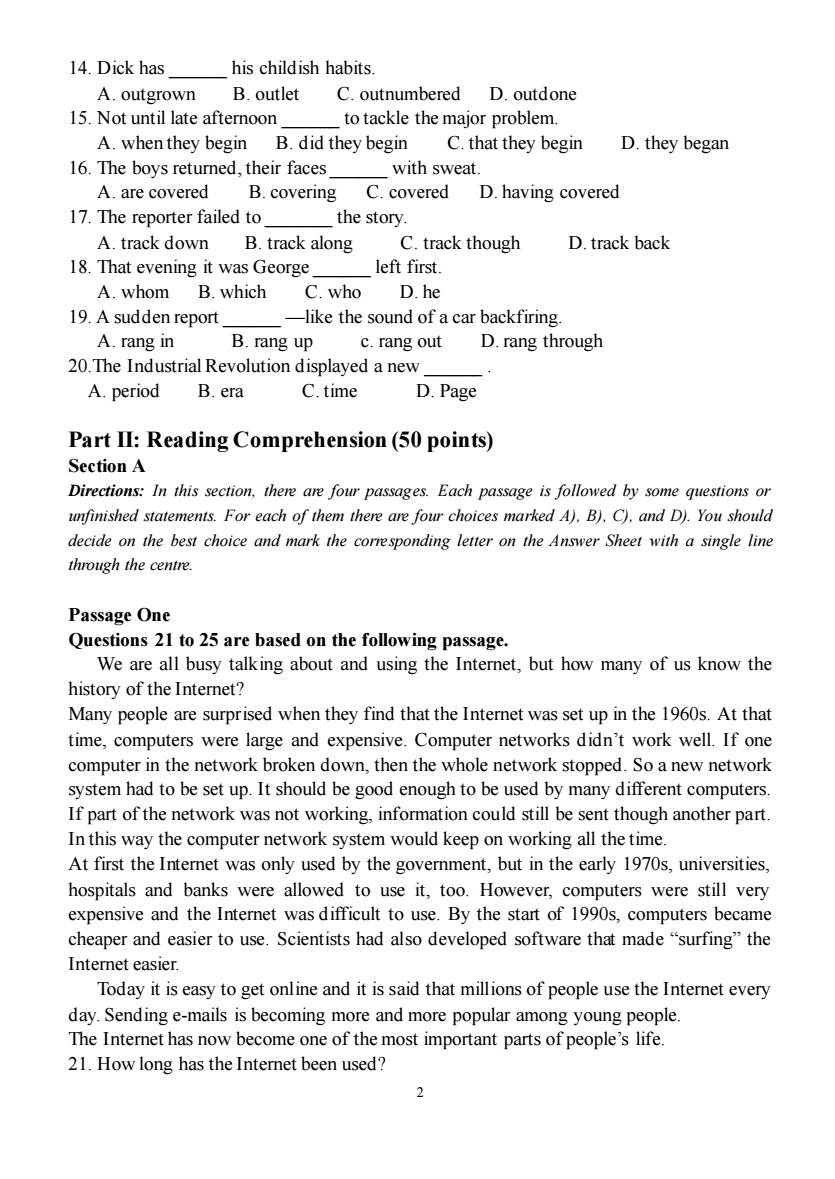
14.Dick has his childish habits. A.outgrown B.outlet C.outnumbered D.outdone 15.Not until late afternoon to tackle the major problem. A.when they begin B.did they begin C.that they begin D.they began 16.The boys returned,their faces with sweat. A.are covered B.covering C.covered D.having covered 17.The reporter failed to the story. A.track down B.track along C.track though D.track back 18.That evening it was George left first. A.whom B.which C.who D.he 19.A sudden report -like the sound of a car backfiring. A.rang in B.rang up c.rang out D.rang through 20.The Industrial Revolution displayed a new A.period B.era C.time D.Page Part II:Reading Comprehension(50 points) Section A Directions:In this section.there are four passages.Each passage is followed by some questionsor unfinished statements.For each of them there are four choices marked A).B).C).and D).You should decide on the best choice and mark the corresponding letter on the Answer Sheet with a single line through the centre Passage One Questions 21 to 25 are based on the following passage. We are all busy talking about and using the Internet,but how many of us know the history of the Internet? Many people are surprised when they find that the Internet was set up in the 1960s.At that time,computers were large and expensive.Computer networks didn't work well.If one computer in the network broken down,then the whole network stopped.So a new network system had to be set up.It should be good enough to be used by many different computers. If part of the network was not working.information could still be sent though another part In this way the computer network system would keep on working all the time. At first the Internet was only used by the government,but in the early 1970s,universities, hospitals and banks were allowed to use it.too.However.computers were still verv expensive and the Internet was difficult to use.By the start of 1990s,computers became cheaper and easier to use.Scientists had also developed software that made "surfing"the Internet easier. Today it is easy to get online and it is said that millions of people use the Internet every day.Sending e-mails is becoming more and more popular among young people The Internet has now become one of the most important parts of people's life. 21.How long has the Internet been used?
2 14. Dick has ______ his childish habits. A. outgrown B. outlet C. outnumbered D. outdone 15. Not until late afternoon ______ to tackle the major problem. A. when they begin B. did they begin C. that they begin D. they began 16. The boys returned, their faces ______ with sweat. A. are covered B. covering C. covered D. having covered 17. The reporter failed to _______ the story. A. track down B. track along C. track though D. track back 18. That evening it was George ______ left first. A. whom B. which C. who D. he 19. A sudden report ______ —like the sound of a car backfiring. A. rang in B. rang up c. rang out D. rang through 20.The Industrial Revolution displayed a new ______ . A. period B. era C. time D. Page Part II: Reading Comprehension (50 points) Section A Directions: In this section, there are four passages. Each passage is followed by some questions or unfinished statements. For each of them there are four choices marked A), B), C), and D). You should decide on the best choice and mark the corresponding letter on the Answer Sheet with a single line through the centre. Passage One Questions 21 to 25 are based on the following passage. We are all busy talking about and using the Internet, but how many of us know the history of the Internet? Many people are surprised when they find that the Internet was set up in the 1960s. At that time, computers were large and expensive. Computer networks didn’t work well. If one computer in the network broken down, then the whole network stopped. So a new network system had to be set up. It should be good enough to be used by many different computers. If part of the network was not working, information could still be sent though another part. In this way the computer network system would keep on working all the time. At first the Internet was only used by the government, but in the early 1970s, universities, hospitals and banks were allowed to use it, too. However, computers were still very expensive and the Internet was difficult to use. By the start of 1990s, computers became cheaper and easier to use. Scientists had also developed software that made “surfing” the Internet easier. Today it is easy to get online and it is said that millions of people use the Internet every day. Sending e-mails is becoming more and more popular among young people. The Internet has now become one of the most important parts of people’s life. 21. How long has the Internet been used?
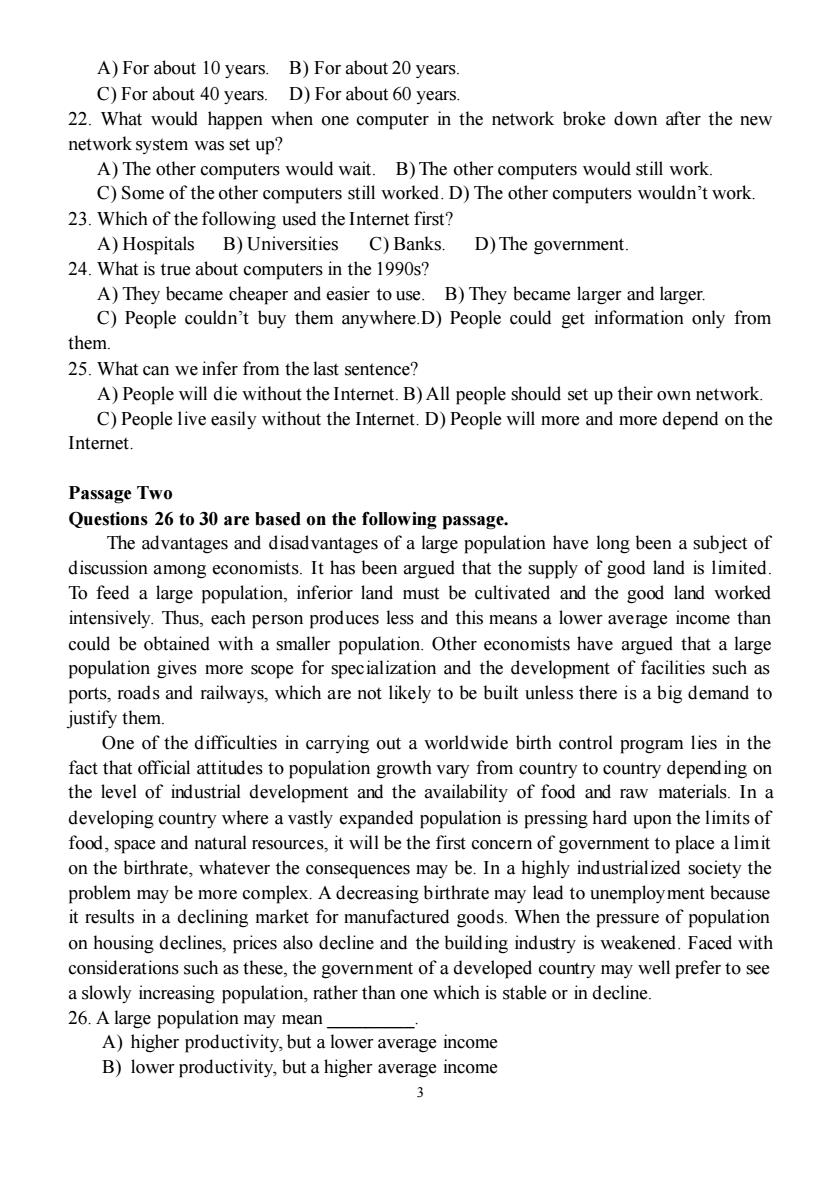
A)For about 10 years.B)For about 20 years. C)For about 40 years. D)For about 60 years. 22.What would happen when one computer in the network broke down after the new network system was set up? A)The other computers would wait.B)The other computers would still work. C)Some of the other computers still worked.D)The other computers wouldn't work. 23.Which of the following used the Internet first? A)Hospitals B)Universities C)Banks. D)The government 24.What is true about computers in the 1990s? A)They became cheaper and easier to use.B)They became larger and larger C)People couldn't buy them anywhere.D)People could get information only from them 25.What can we infer from the last sentence? A)People will die without the Internet.B)All people should set up their own network. C)People live easily without the Interet.D)People will more and more depend on the Internet. Passage Two Questions 26 to 30 are based on the following passage. The advantages and disadvantages of a large population have long been a subject of discussion among economists.It has been argued that the supply of good land is limited To feed a large population,inferior land must be cultivated and the good land worked intensively.Thus,each person produces less and this means a lower average income than could be obtained with a smaller population.Other economists have argued that a large population gives more scope for specialization and the development of facilities such as ports,roads and railways,which are not likely to be built unless there is a big demand to justify them One of the difficulties in carrying out a worldwide birth control program lies in the fact that official attitudes to population growth vary from country to country depending on the level of industrial development and the availability of food and raw materials.In a developing country where a vastly expanded population is pressing hard upon the limits of food,space and natural resources,it will be the first concern of government to place a limit on the birthrate,whatever the consequences may be.In a highly industrialized society the problem may be more complex.A decreasing birthrate may lead to unemploy ment because it results in a declining market for manufactured goods.When the pressure of population on housing declines,prices also decline and the building industry is weakened.Faced with considerations such as these,the government of a developed country may well prefer to see a slowly increasing population,rather than one which is stable or in decline. 26.A large population may mean A)higher productivity,but a lower average income B)lower productivity,but a higher average income
3 A) For about 10 years. B) For about 20 years. C) For about 40 years. D) For about 60 years. 22. What would happen when one computer in the network broke down after the new network system was set up? A) The other computers would wait. B) The other computers would still work. C) Some of the other computers still worked. D) The other computers wouldn’t work. 23. Which of the following used the Internet first? A) Hospitals B) Universities C) Banks. D) The government. 24. What is true about computers in the 1990s? A) They became cheaper and easier to use. B) They became larger and larger. C) People couldn’t buy them anywhere.D) People could get information only from them. 25. What can we infer from the last sentence? A) People will die without the Internet. B) All people should set up their own network. C) People live easily without the Internet. D) People will more and more depend on the Internet. Passage Two Questions 26 to 30 are based on the following passage. The advantages and disadvantages of a large population have long been a subject of discussion among economists. It has been argued that the supply of good land is limited. To feed a large population, inferior land must be cultivated and the good land worked intensively. Thus, each person produces less and this means a lower average income than could be obtained with a smaller population. Other economists have argued that a large population gives more scope for specialization and the development of facilities such as ports, roads and railways, which are not likely to be built unless there is a big demand to justify them. One of the difficulties in carrying out a worldwide birth control program lies in the fact that official attitudes to population growth vary from country to country depending on the level of industrial development and the availability of food and raw materials. In a developing country where a vastly expanded population is pressing hard upon the limits of food, space and natural resources, it will be the first concern of government to place a limit on the birthrate, whatever the consequences may be. In a highly industrialized society the problem may be more complex. A decreasing birthrate may lead to unemployment because it results in a declining market for manufactured goods. When the pressure of population on housing declines, prices also decline and the building industry is weakened. Faced with considerations such as these, the government of a developed country may well prefer to see a slowly increasing population, rather than one which is stable or in decline. 26. A large population may mean _________. A) higher productivity, but a lower average income B) lower productivity, but a higher average income
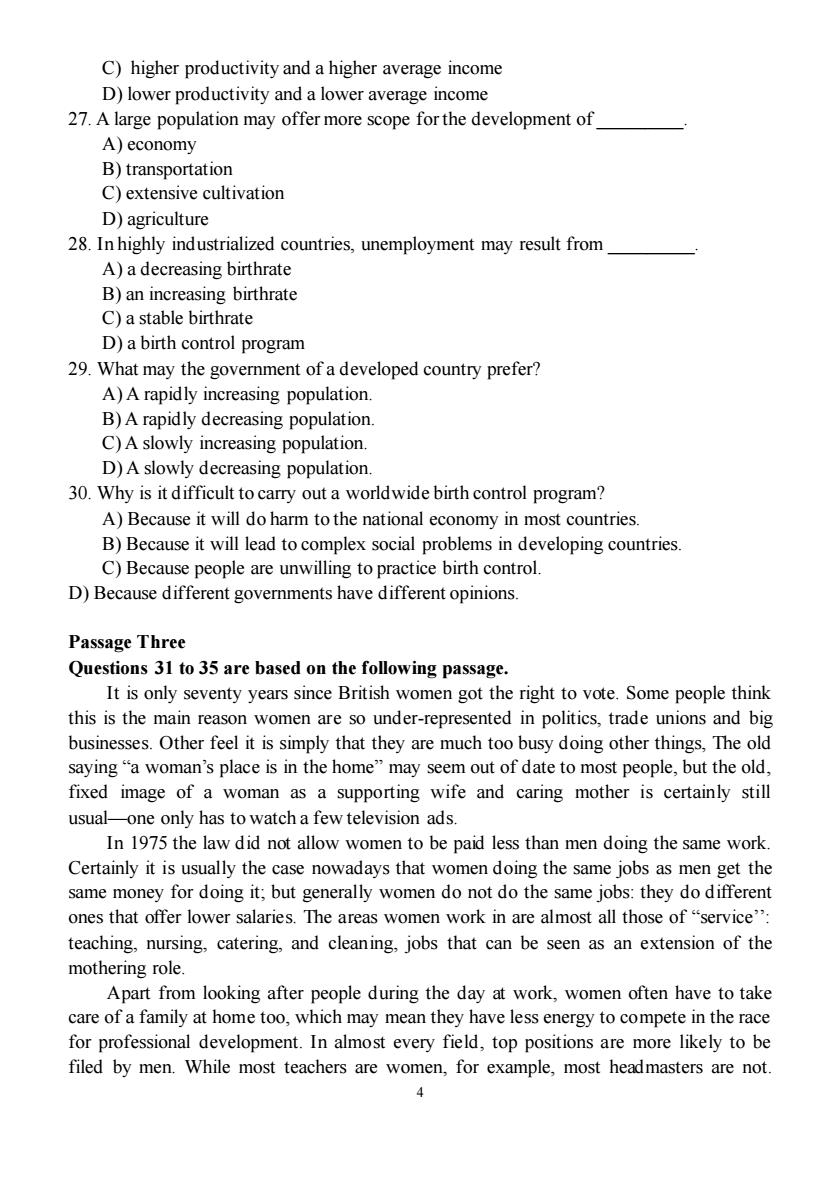
C)higher productivity and a higher average income D)lower productivity and a lower average income 27.A large population may offer more scope for the development of. A)economy b)transportation C)extensive cultivation D)agriculture 28.In highly industrialized countries,unemployment may result from A)a decreasing birthrate B)an increasing birthrate C)a stable birthrate D)a birth control program 29.What may the government of a developed country prefer? A)A rapidly increasing population B)A rapidly decreasing population. C)A slowly increasing population. D)A slowly decreasing population. 30.Why is it difficult to carry out a worldwide birth control program? A)Because it will do harm to the national economy in most countries. B)Because it will lead to complex social problems in developing countries C)Because people are unwilling to practice birth control. D)Because different govemments have different opinions. Passage Three Questions 31 to 35 are based on the following passage. It is only seventy years since British women got the right to vote.Some people think this is the main reason women are so under-represented in politics,trade unions and big businesses.Other feel it is simply that they are much too busy doing other things,The old saying"a woman's place is in the home"may seem out of date to most people,but the old. fixed image of a woman as a supporting wife and caring mother is certainly still usual-one only has to watch a few television ads. In 1975 the law did not allow women to be paid less than men doing the same work Certainly it is usually the case nowadays that women doing the same jobs as men get the same money for doing it;but generally women do not do the same jobs:they do different ones that offer lower salaries.The areas women work in are almost all those of"service'': teaching,nursing,catering,and cleaning,jobs that can be seen as an extension of the mothering role. Apart from looking after people during the day at work,women often have to take care of a family at home too,which may mean they have less energy to compete in the race for professional development.In almost every field,top positions are more likely to be filed by men.While most teachers are women,for example,most headmasters are not
4 C) higher productivity and a higher average income D) lower productivity and a lower average income 27. A large population may offer more scope for the development of _________. A) economy B) transportation C) extensive cultivation D) agriculture 28. In highly industrialized countries, unemployment may result from _________. A) a decreasing birthrate B) an increasing birthrate C) a stable birthrate D) a birth control program 29. What may the government of a developed country prefer? A) A rapidly increasing population. B) A rapidly decreasing population. C) A slowly increasing population. D) A slowly decreasing population. 30. Why is it difficult to carry out a worldwide birth control program? A) Because it will do harm to the national economy in most countries. B) Because it will lead to complex social problems in developing countries. C) Because people are unwilling to practice birth control. D) Because different governments have different opinions. Passage Three Questions 31 to 35 are based on the following passage. It is only seventy years since British women got the right to vote. Some people think this is the main reason women are so under-represented in politics, trade unions and big businesses. Other feel it is simply that they are much too busy doing other things, The old saying “a woman’s place is in the home” may seem out of date to most people, but the old, fixed image of a woman as a supporting wife and caring mother is certainly still usual—one only has to watch a few television ads. In 1975 the law did not allow women to be paid less than men doing the same work. Certainly it is usually the case nowadays that women doing the same jobs as men get the same money for doing it; but generally women do not do the same jobs: they do different ones that offer lower salaries. The areas women work in are almost all those of “service’’: teaching, nursing, catering, and cleaning, jobs that can be seen as an extension of the mothering role. Apart from looking after people during the day at work, women often have to take care of a family at home too, which may mean they have less energy to compete in the race for professional development. In almost every field, top positions are more likely to be filed by men. While most teachers are women, for example, most headmasters are not
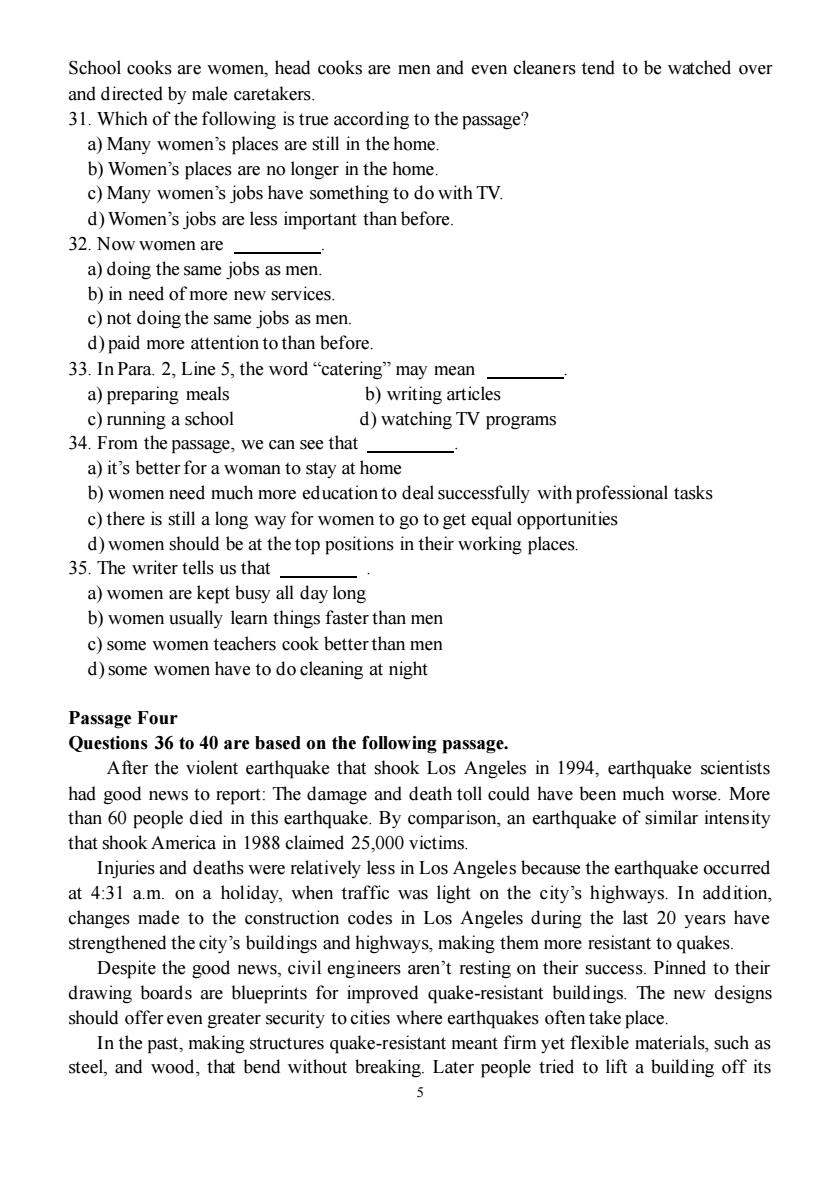
School cooks are women,head cooks are men and even cleaners tend to be watched over and directed by male caretakers 31.Which of the following is true according to the passage? a)Many women's places are still in the home. b)Women's places are no longer in the home. c)Many women's jobs have something to do with TV. d)Women's jobs are less important than before. 32.Now women are a)doing the same jobs as men. b)in need of more new services. c)not doing the same jobs as men. d)paid more attention to than before. 33.In Para.2,Line 5,the word "catering"may mean a)preparing meals b)writing articles c)running a school d)watching TV programs 34.From the passage,we can see that a)it's better for a woman to stay at home b)women need much more education to deal successfully with professional tasks c)there is still a long way for women to go to get equal opportunities d)women should be at the top positions in their working places. 35.The writer tells us that a)women are kept busy all day long b)women usually learn things faster than men c)some women teachers cook better than men d)some women have to do cleaning at night Passage Four Questions 36 to 40 are based on the following passage. After the violent earthquake that shook Los Angeles in 1994,earthquake scientists had good news to report:The damage and death toll could have been much worse.More than 60 people died in this earthquake.By comparison,an earthquake of similar intensity that shook America in 1988 claimed 25,000 victims. Injuries and deaths were relatively less in Los Angeles because the earthquake occurred at 4:31 a.m.on a holiday,when traffic was light on the city's highways.In addition, changes made to the construction codes in Los Angeles during the last 20 years have strengthened the city's buildings and highways,making them more resistant to quakes. Despite the good news,civil engineers aren't resting on their success.Pinned to their drawing boards are blueprints for improved quake-resistant buildings.The new designs should offer even greater security to cities where earthquakes often take place In the past,making structures quake-resistant meant firm yet flexible materials,such as steel,and wood,that bend without breaking.Later people tried to lift a building off its
5 School cooks are women, head cooks are men and even cleaners tend to be watched over and directed by male caretakers. 31. Which of the following is true according to the passage? a) Many women’s places are still in the home. b) Women’s places are no longer in the home. c) Many women’s jobs have something to do with TV. d) Women’s jobs are less important than before. 32. Now women are . a) doing the same jobs as men. b) in need of more new services. c) not doing the same jobs as men. d) paid more attention to than before. 33. In Para. 2, Line 5, the word “catering” may mean . a) preparing meals b) writing articles c) running a school d) watching TV programs 34. From the passage, we can see that . a) it’s better for a woman to stay at home b) women need much more education to deal successfully with professional tasks c) there is still a long way for women to go to get equal opportunities d) women should be at the top positions in their working places. 35. The writer tells us that . a) women are kept busy all day long b) women usually learn things faster than men c) some women teachers cook better than men d) some women have to do cleaning at night Passage Four Questions 36 to 40 are based on the following passage. After the violent earthquake that shook Los Angeles in 1994, earthquake scientists had good news to report: The damage and death toll could have been much worse. More than 60 people died in this earthquake. By comparison, an earthquake of similar intensity that shook America in 1988 claimed 25,000 victims. Injuries and deaths were relatively less in Los Angeles because the earthquake occurred at 4:31 a.m. on a holiday, when traffic was light on the city’s highways. In addition, changes made to the construction codes in Los Angeles during the last 20 years have strengthened the city’s buildings and highways, making them more resistant to quakes. Despite the good news, civil engineers aren’t resting on their success. Pinned to their drawing boards are blueprints for improved quake-resistant buildings. The new designs should offer even greater security to cities where earthquakes often take place. In the past, making structures quake-resistant meant firm yet flexible materials, such as steel, and wood, that bend without breaking. Later people tried to lift a building off its